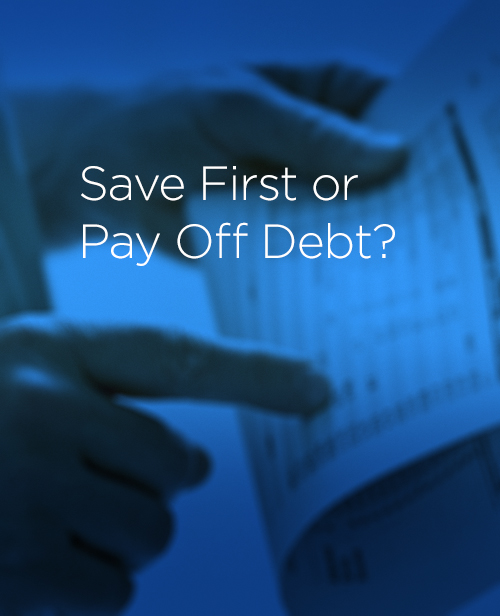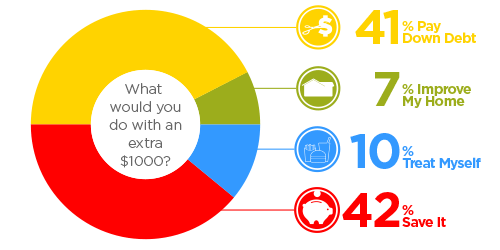Ever wonder if you should you focus on building up savings or paying off debt first? In a recent survey asking people what they would do with an extra $1,000, the results showed a near-tie between saving (42%) and paying down debt (41%). To find the best answer for you, ask yourself the following questions:
(Money, October 2013)
1. Do you already have an emergency fund? Everyone needs emergency savings, even those with existing high-interest credit card debt. Because emergencies can happen at any time, you can’t necessarily count on credit cards or other loans to protect you. Aim to have at least three months’ worth of expenses in the bank. Even if money is tight, make putting aside a portion of your paycheck for emergencies a priority. If you already have an emergency fund, go to the next question.
2. How much is your debt costing you? Many people don’t take the time to do the math. Here’s how: Make a list of all your loans (auto, mortgage, credit cards, etc.) and next to each amount, write down the interest rate. Multiply the two numbers, and that’s about how much that loan is costing you per year. That’s a valuable piece of information!
3. Compare the results from #1 and #2. Would paying off a chunk of your debt save you more money than you could earn by saving the cash? If so, then you might be better off paying off the debt. Another important point to consider: What are your financial goals (buying a house, starting a business, etc.)? Assuming you have an emergency fund in place, the final answer varies with each individual, and might involve a mixture of both saving and paying off debt.
(“Should You Save or Pay Off Debt?” U.S. News & World Report, viewed August 30, 2013)
13PFS568
Related
6 Comments
Comments are closed.




Great piece of advice!! Everyone should know this!!
You should do exactly what the results of the study are saying which is split your extra income in two to pay your debt and save. The cost of long term debt is high therefore it should be eliminated A.S.A.P. The cost of not saving long term for retirement or for an emergency fund is even worst therefore, we should balance both to reach financial stability.
I believe that paying off debt should come second to paying yourself first. What I’ve learned (from experience) is that by the time you’ve paid everyone else and haven’t put “you” in the equation there’s nothing left. Plus, paying yourself first gives you a sense of accomplishment and creates a valuable habit that will benefit you in the long run.
No emergency fund now, but costs me not to have one. In non-profit debt consolidation program to get debt pd off sooner. They were able to negotiate with all companies to reduce interest to 6% on my credit cards to get paid off quicker.
That is an amazing little piece of information, thank you.
If you only read one thing today read this.